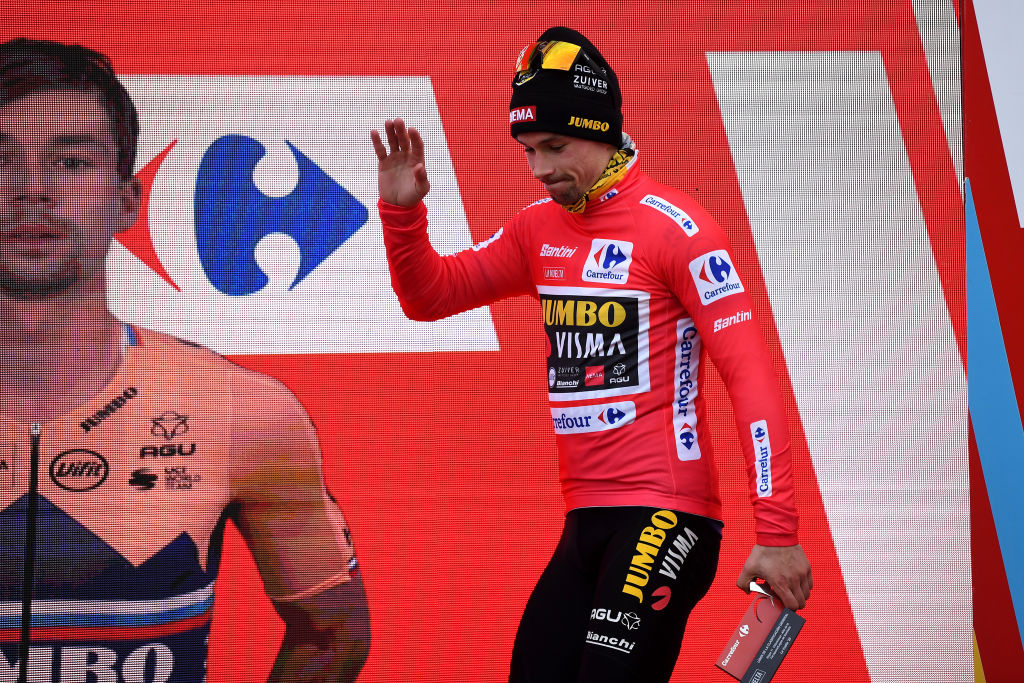Roglic, Carapaz locked atop Vuelta a Espana standings after key mountain stage
Jumbo-Visma play a strong defensive game on eve of Angliru stage

At first glance, you could say Primoz Roglic (Jumbo-Visma) and Richard Carapaz (Ineos Grenadiers) completed the Vuelta a Espana's toughest mountain stage exactly as they had begun it, tied on time in the overall standings and with the Slovenian in the lead.
However, if stage victories were decided on team support, on Saturday Roglic won hands down, as Jumbo-Visma maintained a tight grip on the favourites group all the way up the Alto de la Farrapona with barely a flicker of opposition.
Thus Roglic enjoyed an armchair ride to the finish, taking tenth on the stage after the most impressive display of collective climbing teamwork yet by any squad in the Vuelta.
After some early collaboration from Ineos Grenadiers to keep the break in check, Jumbo-Vimsa's Lennard Hofstede kept matters under control almost singlehandedly on the second last climb of the San Lorenzo.
Then, barring some brief and somewhat unexpected collaboration from UAE Team Emirates, his yellow-and-black clad teammate Jonas Vingegaard led a steady, if unspectacular, pace for almost 20 kilometres up the length of the Farrapona.
Almost within sight of the finishing gantries, a brief dig by Mikel Nieve (Mitchelton-Scott) finally saw the Dane swing off the front, but Sepp Kuss and George Bennett were waiting in the wings to take over.
As a result, even without a rider of the calibre of Tom Dumoulin following the Dutchman's abandon, on a stage with more than 4,600 vertical metres of climbing, Jumbo-Visma looked more than up to the task of defending Roglic's narrowest of leads.
Get The Leadout Newsletter
The latest race content, interviews, features, reviews and expert buying guides, direct to your inbox!
"It was OK, a hard day in the mountains, everything was under control," Roglic commented after his usual warm-down.
"[Marc] Soler (Movistar) is a super-strong guy and of course, he escaped early on by bridging across to that break, but we didn't really panic. Then apart from Dan Martin (Israel Start-up Nation) right in the final, no-one showed much interest in any big attacks."
Asked about the riders' protest at the start over how time split rules were applied, Roglic - who, through no fault or intent of his own, took the leader's jersey as a result - took a diplomatic stance, suggesting his interest was in racing, full stop.
"I'm not the guy to say how it has to be, I'm not the jury [commissaire]," he argued. "We respect the jersey and we do what is needed to control the race. Tomorrow is a new day, with new challenges."
As for the other GC contenders, Saturday confirmed what has been seen so far in the Vuelta and little more. Collectively, the Spanish Movistar team look to be the most dangerous but their leader, Enric Mas, is nearly two minutes down and even after his day-long effort, Soler remains on the outer edge of the danger zone on GC at nearly three.
Meanwhile, arch-rival Carapaz's Ineos Grenadiers have so far seemed a distant relative of the all-conquering team that racked up seven stages and the overall - despite losing leader Geraint Thomas - in the recently completed Giro d'Italia.
On stage 11, although Australia's Cameron Wurf put in a fine job on the earlier climbs, Carapaz' two strongest mountain domestiques on this year's race, Andrey Amador and Dylan van Baarle were both dropped between five and four kilometres to go on the Farrapona and Chris Froome, who has done some sterling early work on previous stages, was no longer in the main group almost before the Farrapona started.
As a result, the Ecuadorian was isolated, while Jumbo-Visma's collective strength all but put paid to any hopes of an attack by other riders. As if that was not demoralizing enough for their rivals, the man who was the spearhead of Jumbo-Visma's iron defence on the Farrapona climb, Jonas Vingegaard, insisted he wasn't even driving at 100 per cent of his strength.
"I didn't go all out," Vingegaard told ITV afterwards. "We just kept the pace I knew I could hold for a long time and nobody attacked.
"I was just going until somebody attacked and then I was off the front. It was quite a hard stage, and I think they are saving something for tomorrow's stage on the Angliru."
"The guys are definitely super-strong," Roglic added, "and they are riding at a high level and doing a great job, so hopefully we'll just continue like that."
As for how he expects to fare on the Angliru, where Carapaz and the rest of his rivals will have to attack unless they want to risk Roglic effectively winning the race in Tuesday's time trial, Roglic admitted he had no prior knowledge of the climb.
"It's the first time I will do it, I've seen some videos of it and it's super hard. I don't think I've ever ridden one so steep," he observed.
In stark comparison to the all but non-existent GC battle on Farrapona, Roglic said he would be expecting lots of attacks. "We'll definitely come in one by one at the top of the Angliru," he predicted, before adding with a dose of wry humour, "it'll be very cool and nice - for the guys watching it on TV."
Alasdair Fotheringham has been reporting on cycling since 1991. He has covered every Tour de France since 1992 bar one, as well as numerous other bike races of all shapes and sizes, ranging from the Olympic Games in 2008 to the now sadly defunct Subida a Urkiola hill climb in Spain. As well as working for Cyclingnews, he has also written for The Independent, The Guardian, ProCycling, The Express and Reuters.
